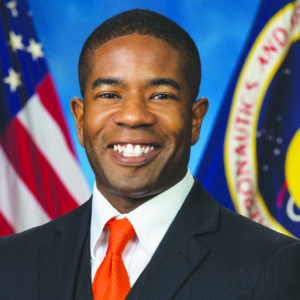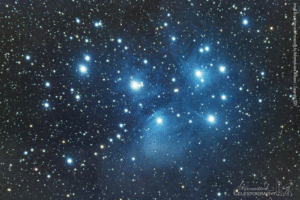Nehemiah Williams, PhD ’04
The science fiction film, Interstellar, blends the genres of documentary, reality, dystopian apocalypse, and science fiction and features a world in which one man nurtures dreams of space—a part of something deep within him. Its themes run deep. It is about much more than just science and nudges toward the realms of ethics, philosophy, and even theology. Early on, aching with deep conviction on the purpose of humanity, the main character, Cooper, responds to conspiracy-style condescending tones from a teacher who claims the moon landing was fabricated and NASA was a worthless endeavor. He barks back gently, “We are explorers, pioneers; we have always been.”
While in some respects, the concept of the explorer has come to be associated with various wrongful— even shameful—periods across human history, alumnus Nehemiah Williams, PhD ’04, a NASA aerospace engineer, has a measured and carefully qualified view. “All people, at all times throughout human history, have pioneered and explored and pushed the boundaries of things. It is a part of our nature, even going back to biblical times.”

Having recently had the pleasure of sitting with Nehemiah, his full-on Texas-style cowboy boots stretched out under a café table, I was struck with the wonder of space and his interest in it. Prior to our meeting, I had checked one of his personal social media pages, where among the occasional personal posts, he mainly shares news from NASA and his work there (at least, what he is allowed to share) and incredibly crafted photos of stars, planets, and galaxies none of us will ever see, even through a telescope, let alone—of course—with the naked eye. But we may still stare up at the stars at night and wonder.
Nehemiah started wondering and looking heavenward long ago. Raised in a Christian home in South Jersey, he first spied the planet Mars through a telescope when he was 14; from then, he was smitten.
A strong argument can be made that there has been a precipitous decline in interest in space from the 1960s onward. Recent high-profile news of Elon Musk’s and Jeff Bezos’ space-related endeavors and the announcement of the Space Force may have elicited national (and international) response in one direction or the other, but it’s hard to suggest that the fervor for space exploration has grown—at all—since the moon landing and other Time Life cover-worthy events of recent history.
So when Nehemiah, while a student at Cairn, shared his dream of being an astronaut, many looked at him like he was the kid who never grew out of his dream. “It’s not a thing that a lot of people say to start with, and you have a better chance of winning the lottery than becoming an astronaut,” says Williams. But through his time at Cairn, he never stopped looking up, and even though he spent some time as a social work major (he has always been a person who wants to help people), he came to the conclusion that he was still headed, one way or the other, for space (or at least a career in aerospace or some space-related discipline).
Nehemiah recalls two conversations with faculty that were a challenge: one when he shared that he wanted to work for NASA as an aerospace engineer (not one of Cairn’s regular majors) and one in which he debated a professor over whether the night sky phenomenon that was visible during an evening astronomy observation session was actually the Northern Lights, which are rarely visible from latitudes that far south of the Arctic Circle. In the second case, a call to a local astronomer at the Franklin Institute in Philadelphia confirmed Nehemiah’s initial hypothesis. “I actually got a public apology on that one in class. I was right, and the professor was so gracious about it.” On the first, years later, another professor—upon learning that Nehemiah successfully completed a second bachelor’s in engineering, a master’s, and a PhD and is now an aerospace engineer with NASA—contacted him to congratulate him and celebrate his success on walking his own path. Nehemiah was deeply touched by each of these individuals, but his story supports a clear hypothesis: in the last 100 years, the path to the sciences for orthodox Christians has not been well-paved.
Few Christians in secular fields are asked more than those in the sciences how their faith influences their work. In my conversation with Nehemiah, I almost regretted asking. It could be said of every profession that one’s faith ought to be the centrifuge, but unfortunately, the perceived juxtaposition between faith and science has led to far too many distracted conversations; nevertheless, Nehemiah shares that the foundation and training he received at Cairn have been tremendously helpful to him. The Bible is not a science book, and Christians who try to read science back into every part of it are missing the point. At the same time, science offers a very limited worldview that completely ignores moral responsibility, as its limits are only the boundaries of that which can be demonstrated in a scientific laboratory. “If all we know and all that is true is all that science has ‘proven,’” explains Nehemiah, “then Pluto (discovered by American astronomer Clyde Tombaugh in 1930) did not exist prior to the time it was identified, and we know that is not true.”
Such musings are just the tip of the iceberg for Nehemiah, who can be (I know from experience) pulled into any gravitationally fed conversational orbit, so long as it is replete with deep, philosophical, scientific questions. And beyond all of this, there is the deep child-like wonder and excitement, still there decades later.

The Pleiades is star formation known as an open star cluster and is located within our own Milky Way galaxy at a distance of over 440 light-years away. The seven brightest stars in this open star cluster were known to the ancient Greeks as the “Seven Sisters.” The Old Testament has several specific references to the Pleiades, known in Hebrew as “Kiymah” including Job 9:9; Job 38:31; and Amos 5:8, which reads (NASB):
“He who made the Pleiades and Orion,
And changes deep darkness into the morning,
Who also darkens day into night,
Who calls for the waters of the sea
And pours them out on the surface of the earth,
The LORD is His name.”
He pulled out his phone at least five times to share photos he had taken through his telescope and camera combination to illustrate his point. Indeed, viewing heavenly bodies in space, captured in the crystal clarity of modern technology and skill, makes one actually start to understand the soft and crisp PBS-style documentaries detailing the beauty of space, gases,
rings, stars, and more. “This is the Andromeda Galaxy,” he explains. “It is about 2.5 million light-years away and is one of the furthest objects in the night sky that is visible without a telescope.”
When Nehemiah attended Cairn, there was no science, math, or other related programs that would have prompted this kind of discipline-specific, self-proclaimed nerdiness he proudly and unashamedly wears. It is a beautiful thing today to see people passionate about their work. I was delighted to share that Cairn has begun a biology program, among the many other majors we have developed over the last 10 years specifically for students like him. That one of our professors recently wrote on the ethics of genetic engineering and that one of our deans recently authored a chapter in a widely published book on deconstruction, specifically addressing the dangers of scientism and the loss of faith for young people, should be a great comfort to many. Students now coming to Cairn have more opportunities than ever before to encounter a wide range of disciplines and to see the integration of biblical thinking in all areas. This is progress. But no long journey is easy.
When I asked Nehemiah (what I thought was a fair question) whether or not he regrets coming to Cairn before setting out en route to his dream work, he did not hesitate for one second. He has no regrets, and his proficiency of biblical understanding and frequent references to professors who impacted him testify to his candor.
Still, it takes a particular kind of bravery not to give up on a dream—or one may say, a calling. “I’m stubborn,” Nehemiah said. Maybe you should just say, persistent?” I replied.
He seems mollified. But regardless of the adjective—stubborn or persistent—I, personally, left our time encouraged. Explorers ought to have a stubborn strain, and they certainly must persist.
And maybe, just maybe, there are many more young explorers out there, staring into the heavens, envisioning a place which they may one day be, to which each is called. Perhaps these pioneers—in an ever-growing realm of vocational attraction—could benefit from an education that can play a pivotal part in producing an unshakeable faith in a God who does not change and has called His people to all sorts of far-flung places for His glory and His honor—whether in Philadelphia, the world, or, eventually, in the stars He created.
Nate Wambold ’99 is the vice president for alumni and community affairs. He can be reached at nwambold@cairn.edu